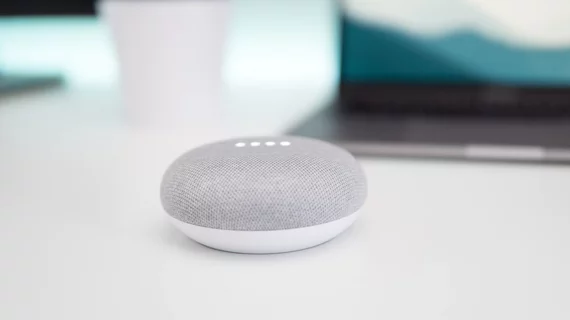Experimental tool leverages smart speaker tech to detect cardiac arrest
Researchers at the University of Washington are hoping to catch out-of-hospital cardiac arrests (OHCAs) early with an algorithm that, when integrated with smart speakers like the Google Home or Amazon Alexa, can monitor people for audible cardiac arrest symptoms while they sleep.
The proof-of-concept tool, according to a June 19 study in npj Digital Medicine, was designed by UW professor Shyam Gollakota et al. to pick up on agonal breathing—the guttural, gasping noise that accompanies 50% of cardiac arrests. The team trained the algorithm to detect irregularities in people’s breathing patterns while they sleep, since recent research suggests most residential OHCAs occur in bedrooms or living rooms.
Gollakota and his colleagues developed the tool using breathing data from real 911 calls to Seattle’s Emergency Medical Services, asking callers to place their phone near the victims’ mouths so dispatchers could determine whether each patient needed immediate CPR based on their breathing. Those calls were recorded and collected, numbering 162 over an eight-year period that ended in 2017.
The researchers then broke down individual EMS calls, extracting 2.5 seconds of audio at the start of each agonal breath. A total of 236 clips were captured on three smart devices—an Amazon Alexa, an iPhone 5s and a Samsung Galaxy S4—and Gollakota et al. used machine learning to boost that dataset to 7,316 positive clips.
The team’s 911 data was fed to the algorithm alongside a negative dataset of 7,305 sound samples collected during sleep studies. Those samples were representative of typical noises a person would make while they sleep, like snoring or obstructive sleep apnea.
The UW tool processed both datasets and taught itself to detect agonal breathing with 97% accuracy, as long as the smart device was placed within 20 feet of the source. Gollakota and colleagues trained the algorithm to differentiate between agonal breathing and other labored breathing, and accommodated for typical household noises like barking dogs and air conditioning units.
“A lot of people have smart speakers in their homes, and these devices have amazing capabilities that we can take advantage of,” Gollakota said in a press release. “We envision a contactless system that works by continuously and passively monitoring the bedroom for an agonal breathing event, and alerts anyone nearby to come provide CPR. And then if there’s no response, the device can automatically call 911.”
He said the algorithm could function as an app or Alexa skill that could run locally on processors contained in the smart speaker or phone.
“Right now, this is a good proof-of-concept using the 911 calls in the Seattle metropolitan area,” Gollakota said. “But we need to get access to more 911 calls related to cardiac arrest so that we can improve the accuracy of the algorithm further and ensure that it generalizes across a larger population.”

